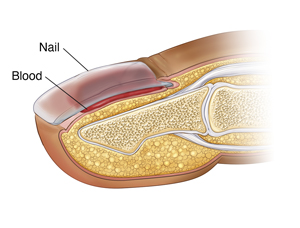Subungual Hematoma
You just slammed the car door on your finger. The pain is nearly unbearable, and your nail has turned black and blue. It's likely you have a subungual hematoma. This is a pool of blood that collects under a nail after an injury. In most cases, a nail hematoma isn't serious, but it can be very painful.

When to call your healthcare provider
Any severe blow to a finger or toe should be checked by your healthcare provider. You may have broken bones (fractures) or damage to other tissues. If you can't see your healthcare provider right away, go to the nearest emergency department.
Here's what you can expect when you see a healthcare provider:
-
Your nail will be examined.
-
X-rays may be taken to check for a bone fracture or other injury.
-
A procedure called trephination may be done to drain the blood from the hematoma and ease pain. The healthcare provider makes a small hole in the nail using a special lance or drill. The blood under the nail can drain out through this hole and ease the pain and pressure. The nail is then bandaged. Drainage may continue through the hole for 24 to 36 hours.
-
If the nail is badly damaged it may need to be removed. Deep cuts under the nail can then be fixed with stitches.
Follow-up
If the damaged nail isn't removed, it will most likely fall off on its own. A fingernail can regrow in a few months. Toenails take longer—as long as a year and a half. See your healthcare provider if you have any problems with the nail as it heals and regrows.
Online Medical Reviewer:
Marianne Fraser MSN RN
Online Medical Reviewer:
Rajadurai Samnishanth
Online Medical Reviewer:
Rita Sather RN
Date Last Reviewed:
9/1/2023
© 2000-2025 The StayWell Company, LLC. All rights reserved. This information is not intended as a substitute for professional medical care. Always follow your healthcare professional's instructions.